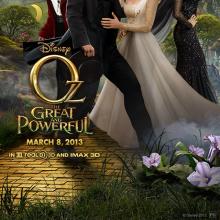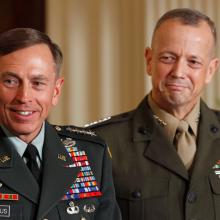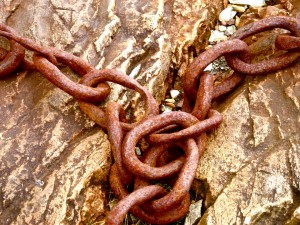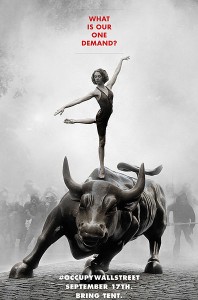Power
NEW YORK CITY has been bombed at least twice in the past decade. First by al Qaeda and second by Hurricane Sandy.
In the wake of the Sept. 11 attacks, the United States launched two ground wars and a worldwide "war on terror." Within two months, Congress federalized the Transportation Security Administration to secure airports. More than 263 government organizations were either created or reorganized. Some 1,931 private companies were put to work on counterterrorism, homeland security, and intelligence. Rightly or wrongly, America moved heaven and earth to stop terrorism in its tracks. It was seen as both an ongoing threat and a moral affront that had to be dealt with.
What about Climate Change?
In February, a New York State Senate task force on Superstorm Sandy compared the hurricane that affected 24 states to the 9/11 terrorist attacks. "[On 9/11] there were more than 3,000 souls lost, but in terms of the geographic destruction, it was isolated to Lower Manhattan," said Sen. Andrew Lanza (R-Staten Island). "[After Sandy] we have miles and miles and miles of destruction. Hundreds of thousands of homes affected, 60 ... New Yorkers killed, 250,000 to 260,000 businesses affected."
Hurricane Sandy killed 253 people in seven countries. It was the second largest Atlantic hurricane ever recorded—and the most expensive. It smashed into the East Coast with barely three days' warning. Like hurricanes Katrina and Rita before it, Sandy was a disaster of biblical proportions.
After 9/11, Americans knew in our gut that something was seriously wrong. Our moral intuition had been sucker punched.
DANIEL BELL'SThe Economy of Desire juxtaposes Christianity and capitalism, situating both in the context of postmodernity. The main argument of the book is that performing works of mercy—both corporal and spiritual—constitutes an alternative economy that can resist capitalism. Capitalism, in Bell's construal, is an economic system founded on voluntary contracts, private property, and an ideological regime where the rule of the market transcends the rule of law and disregards the reign of God in Christ.
The author draws on the work of philosophers Michel Foucault and Gilles Deleuze to set up a philosophical framework for talking about power and desire. His treatment of Foucaultian insights on the ubiquity of power is meant to decenter the state as the primary engine of social change. Deleuze's work builds on Foucault's argument by conceptualizing people—and society at large—as flows of desire. Taken together, the claim is potentially but not necessarily democratic: Social structures organize desire in particular ways and are malleable due to the fact that power resides not only in the state or market but in the relational networks of everyday people. Under this account, for instance, the typical presidential election is not simply about securing votes, but about directing the aspirations and actions of the electorate toward a collective passion for growing the economy, expanding the middle class, and so on. Capitalism, for Bell, secures our loyalty because it shapes what we do as well as what we desire.
A few strengths of the book stand out. It contains a lucid discussion of the difference between commutative (fair contracts) and distributive (fair proportion of wealth, power, and other goods) justice within society. The scope of the author's analysis is also impressive. Bell substantively engages the arguments of diverse figures from Adam Smith, Milton Friedman, and Friedrich von Hayek to Augustine, Thomas Aquinas, and Martin Luther. Moreover, Bell's contention that proponents of capitalism effectively deny the possibility of social holiness is worth the price of the book.
I RECENTLY FINISHED a new book, which we launch on April 1, the day after Easter. The beginning of the Easter season is a liturgically appropriate moment for the introduction of a hopeful book in what many feel is a hopeless time.
I wanted to tell you, our faithful magazine readers, why I wrote this book, and why I called it On God's Side: What Religion Forgets and Politics Hasn't Learned About Serving the Common Good.
This is not just another book for me. I wrote it during a three-month sabbatical that started in a monastery overlooking the Pacific Ocean. Every day started before sunrise with prayers, walks, yoga, and exercise, followed by writing the rest of the day. My other discipline was not to write or comment publicly on the news. I watched the nation's political discourse each night after a day of writing and found it more depressing than ever. It was an election year.
The resulting book is not about politics in the narrow sense, but about how to engage our personal and public lives with an ancient but timely idea and practice—the common good—that has long and deep historical roots across many religious faiths and secular notions of democracy. I sought to explore the biblical and theological roots of the idea, and then apply it to the most basic questions of economic trust, the role of government, civility, renewing democracy, globalization, conflict resolution in a violent world, and, of course, what our faith can contribute to the common good with the world as our parish. Most compelling, I found Jesus' call to love our neighbors to be the gospel foundation for serving the common good, and the excerpt in this issue, "A Gospel for the Common Good" (page 16), makes the case for that.
For Christians, the book explores a fundamental question: Why did Jesus come, and what do the gospel and the mission of the church really entail? The book's message is that when people of faith actually say and do the things their faith stands for, two things happen: at first other people are surprised, and then they are attracted. It examines both inspirations and practices for how we can respond to the growing hunger for a better life together and find common ground for the common good, especially in relation to those who are the most vulnerable.
Like the masses, we flocked this past weekend to the megaplex for the opening of another would-be blockbuster, pleased to discover that the much-heralded and sometimes-maligned Oz prequel is even more good and wonderful than it is great and powerful.
Acting, plot, intrigue, color, mystery, and special effects: all these measure-up under the fantastic mastery of director Sam Raimi. But beyond the eye-candy, sensitive audience members might be as mesmerized by the movie’s deeper myth and redemptive meaning as by its cinematic technique.
Of course, if we remember the original movie and its myth, the wizard has issues, for there’s a man behind the curtain who is much more about a confession of subdued humility than a profession of supernatural agility. The prequel takes us back before the main myth — to see the man inside the man behind the myth.
Somewhere in the magical middle of this movie, the not-yet-wizard Oscar Diggs (James Franco) makes his confession: “I'm not the wizard you were expecting, but I may be the wizard you need.” We can apply this maxim everywhere. This truth uncovers the human simplicity of the Oz legend and its relevance to all our longings in realms related to power and spirit.
THE RICH AND THE REST OF US is a stirring call to arms on eradicating domestic poverty. Co-authored by Cornel West and Tavis Smiley, the self-described "poverty manifesto" seeks to convince readers that economic mobility is increasingly difficult for three demographics—the long-term poor, the new poor, and the near poor. Who are the poor in America? According to the Supplemental Poverty Measure, 150 million Americans are at or below twice the federal poverty level, which is $22,040 for a family of four.
Smiley and West invoke Dr. Martin Luther King Jr.'s legacy throughout the book. King's imprimatur legitimizes their attempt to translate the Occupy Wall Street themes of the wealthy 1 percent and the financially fragile 99 percent for a general audience. Interestingly, the book contains a motivational quality reminiscent of self-help books. Each chapter and subsection opens with an inspirational quote or pithy observation. The authors employ statistics, personal anecdotes, poems, and trend analysis to demonstrate the magnitude of poverty in America.
Making poverty history, to use a popular phrase, is an important ideal. To achieve it, we must ask: Who is responsible for eradicating poverty? The co-authors argue that engaged citizens, an active civil society, and a proactive government are the principal agents for helping impoverished families. In several instances, President Lyndon Johnson's War on Poverty represents the promise of the aforementioned three-pronged approach to mitigating the structural causes and personal implications of poverty. From 1964 to 1973, the writers note, the Johnson administration reduced the national poverty rate from 19 percent to 11 percent. Smiley and West successfully contend that government programs play an indispensable role in eradicating poverty.
In any genuine community ... self-interest and public interest are not at odds, but are two names for the same thing. —Andrew Delbanco
COMMUNITY ORGANIZING has been around for a long time—certainly long before 2008, when it became a household word during Barack Obama's rise to the presidency. Not that it is understood nowadays any more than before.
I thought I knew what community organizing was when I served as the pastor of First Congregational United Church of Christ and was introduced to a newly formed faith-based organizing project called Inland Congregations United for Change (ICUC) in San Bernardino, California. But I soon learned that community organizing had a different starting point, as well as a different methodology, than I thought.
As a pastor, I had always been concerned about challenging injustice. However, I came to understand that community organizing is less about taking on yet another good cause and more about the important work of building human community.
As such, community organizing is a perfect fit for religious congregations and clergy. It addresses social justice concerns in the larger community, putting democracy to work by giving voice to ordinary families. But more important, community organizing can strengthen the life of the congregation. And it can bring power to the vocation of the religious leader.
"WE DON'T WORK toward justice; we bring about justice through systemic change," says Rev. Cindy Weber, with a fierce and loving smile, when asked how her congregation, Jeff Street Baptist Community at Liberty, seeks justice through reaching out to the community. There is no pride or bravado in her statement, but a firmness that comes from more than 20 years of pastoring a small, community church that actively helps bring about God's peace on earth.
Jeff Street, located in Louisville, Ky., has an active membership of approximately 100 people—a David-sized congregation compared to many mainline or mega-churches. However, the creativity, dedication, and passion of the church's members, manifested in hospitality programs for and with the homeless, have made a giant-sized impact on local economic justice issues. And the congregation didn't stop there; as part of a coalition of area churches, Citizens of Louisville Organized and United Together (CLOUT), the church has made an impression with policy work and community organizing on the state level as well. Jeff Street's commitment to empower poor people has even reached internationally: Members have invested in Oikocredit micro-lending programs to the tune of $180,000.
"We are a church that knows the difference between justice and charity, and also between charity and hospitality," says Weber.
Jeff Street, as members call it, started as the Jefferson Street Baptist Chapel, a worship community that had been meeting for decades at Louisville's Jefferson Street Baptist Center, an outreach to homeless people that is a mission of the Southern Baptist-affiliated Long Run Baptist Association. But when the congregation's head pastor left in 1987 and it promoted Rev. Weber from associate to interim pastor, the move touched off a four-year struggle with the Center's parent organization. The Long Run Baptist Association refused to recognize Weber's leadership because she is a woman—even though, at the time, she was also serving as director of the center. In 1991, the year the congregation installed Weber as permanent pastor, it was told to leave the center. The church kept the name "Jeff Street"—the shortened moniker by which Jefferson Street Baptist Center was known in the nearby Clarksdale housing project and environs—and moved a couple blocks south, into a rehabbed former machine shop on Liberty Street.
First, we had CIA Director David Petraeus being held over the fire for a possible affair with his biographer, Paula Broadwell. Then General John Allen, the top-ranking U.S. Commander in Afghanistan, drawn into the drama as allegations of indiscretions of his own with Jill Kelly (the credibility and severity of which remains to be determined), who also is linked to Ms. Broadwell and the related Petraeus drama. Then there’s rumor of FBI agents sending shirtless pictures of themselves to women and … anyway, you get the idea.
As if all of that wasn’t weird enough, now there’s the matter of Kevin Clash, inventor of and voice for Sesame Street’s Elmo, being accused by a young man of having an illicit relationship while the accuser was underage. The man has since recanted his claim, but not before Clash admitted to a consensual encounter with the accuser when he was of legal age, if just barely.
Why do they do it?
THE MASTER, Paul Thomas Anderson’s stomach-punching, fingernails-down-a-chalkboard psychological thriller loosely based on the founding of Scientology, might be more deeply understood as a tale of two egos. We witness a titanic battle for self-control by a man who knows nothing of it (Joaquin Phoenix’s Freddie Quell), while another struggles to distinguish imagination from delusion, his simmering rage emanating perhaps from the terror that the truth he has found may not be enough (Philip Seymour Hoffman’s L. Ron Hubbard surrogate, Lancaster Dodd). Neither of them knows how to love; both are desperate to be loved. They find in each other a conversation partner, a patient, an unrequited lover. They are two of the most human characters the movies have brought us in a long time; their power trips are terrifying, because they may remind us of our own.
There are many key moments: The first meeting between the war veteran and new religious leader, the dictator bonding with his subject over mutual substance abuse; the master holding court in New York society, first offering tender words of potential healing to a grand dame, then exploding at a guest who dares question the source of his “knowledge”; the protégé being experimented with, commanded to walk up and down between a wall and a window until he is both capable of imagining unbridled freedom and driven nearly mad in the process; a science-fictionesque digging for buried treasure on Arizona flatlands that could pass for Mars.
The moment that remains most resonant in my memory after two viewings is still the most ambiguous to me. After Freddie and Dodd first meet, the new father invites the new son (the relationship—and failings of relationship—between fathers and sons is where this film really aches) to attend his daughter’s wedding. The invitation is accompanied by a warning or an invocation: Dodd tells him either “Your memories aren’t welcome” or “Your memories are welcome.” Two viewings leave it unclear—I could check a third time, but it doesn’t really matter, for each is a blessing. You don’t have to carry your trauma always and everywhere. Or you can join this community and still be fully yourself.
EVEN IN AN age of ever-faster news cycles and shorter word counts, some journalists still find ways to dig deep into research and reporting to bring history to life and lift up voices that might otherwise be unheard. Here is an eclectic mix of nonfiction works on issues and people that matter.
Can those who commit violent crimes ever truly be rehabilitated? What happens to them once they’re out of prison? In Life After Murder: Five Men in Search of Redemption (PublicAffairs, 2012), Nancy Mullane follows her subjects from prison to welcome-home parties and beyond. While never minimizing the crimes her subjects have committed, she portrays their full, complicated humanity. Moving insights about the ongoing spiritual, emotional, and practical work of accepting responsibility for great wrongs and rebuilding a life after prison are framed by reporting on the convoluted, expensive prison and parole policies of California.
You might not expect gripping drama from a writer specializing in U.S. Supreme Court history, but that’s what Gilbert King’s Devil in the Grove: Thurgood Marshall, the Groveland Boys, and the Dawn of a New America (Harper, 2012) delivers. Long before he became a Supreme Court Justice, Thurgood Marshall was an NAACP lawyer who risked his life travelling to the Jim Crow South to defend African Americans accused of capital crimes. Devil in the Grove describes his efforts to save a black citrus picker from the electric chair in a Florida county where the Klan and law enforcement were brutally intertwined—and brings alive an era of domestic terrorism against people of color in the not-distant-enough past.
Listening to the scriptures requires a gentle determination to remove the filters that tend, in our religious culture, to allow in only what serves individual solace or personal edification. The scriptures probe the realities of power, how it is cornered, monopolized, deployed, lost, and regained at every level—in societies, in institutions, in families—as well as in the dynamics of our own lives. Even the best Bible study groups and sermons often surrender to the bias exerted unconsciously by our own individual neediness. Perhaps a conscious policy is needed to heed the word of God as it dissects the social body, lays bare its anatomy, and reveals its diseases. This approach may have a greater impact on our personal lives than conventional piety.
Far from reducing the spirituality of our engagement with scripture, learning its hermeneutic of power is likely to intensify our appreciation of its relevance to our own immediate issues and needs. As persons, we internalize and encapsulate the forces at work on a larger scale in a struggling world. God is wholly present as redemptive, suffering, hope-engendering love at every level of existence—from the inner dynamics of the soul to couples, families, neighborhoods, nations, the planet, and the entire universe. One of the most ancient religious instincts of humanity gave rise to the concept of the human person as a microcosm, a world in miniature. Scripture’s word is addressed to us in our unique personhood, and to the churches, communities, and nations in which we are embedded.
I made myself read the Grand Jury report about Sandusky's alleged crimes and it was 23 pages of vile and inhuman behavior not only by the predator but by those who actually saw it, heard of it, or received reports about it across their desk.
Then to also learn that all these children were black deepens my sadness.
I am forced to ask some really hard questions.
Are black people that expendable?
Was the fact that they were black, poor and powerless the reason it was overlooked?
Is football, a school, and personal reputation so important that a 10-year-old black boy being raped in a bathroom can be covered up?
I had an idea that power was corrupt, but this is much more than simply corrupt. It is pure evil.
Visit msnbc.com for breaking news, world news, and news about the economy
Where is the compassion in our economy and our politics? It says much of the economic system that Sojourners even needs to campaign for a "moral budget." How do we, as Christians, challenge structures that allow billions of dollars to be wasted via tax loopholes while 1 in 6 Americans live in poverty?
Will we, as Sachs hopes,
From the official statement by #OccupyWallStreet: "As one people, united, we acknowledge the reality: that the future of the human race requires the cooperation of its members; that our system must protect our rights, and upon corruption of that system, it is up to the individuals to protect their own rights, and those of their neighbors; that a democratic government derives its just power from the people, but corporations do not seek consent to extract wealth from the people and the Earth; and that no true democracy is attainable when the process is determined by economic power."
Last Saturday, August 20, 2011, I got arrested. Having never been arrested before, it feels strange to write that. Like most Americans I associate getting arrested with committing egregiously unlawful acts that require punishment
The earth dries up and withers ... The earth is defiled by its people; they have disobeyed the laws, violated the statutes, and broken the everlasting covenant. - Isaiah 24:4-6
Today I have given you the choice between life and death, between blessings and curses. Now I call on heaven and earth to witness the choice you make. Oh, that you would choose life, so that you and your descendants might live! - Deuteronomy 30:19
During the 1980s, many Christians were at the forefront of a movement to avert nuclear annihilation. They saw this transcendent threat as a moral crisis and felt a responsibility to nonviolently resist, including acts of civil disobedience and divine obedience. Today, we face a comparable danger -- a climate catastrophe which could decimate life on earth. Yet it seems not to have been picked up on the Christian "radar screen" in the same way. For this reason, it is actually more insidious.
"God is Watching," reads the headline for a full page ad Sojourners ran in this morning's Politico. It is the latest in a series of radio, print, and online ads we have put out on the budget debate and default crisis. On Tuesday, we launched radio ads in Kentucky, Nevada, and Ohio that were recorded by local pastors who lifted up the moral issues at stake in the debate.
Furthermore, our work in the past few weeks and the Circle of Protection meeting with the president has been covered by the Washington Post (and here), CNN (and here), MSNBC, Politico, Roll Call, and many local outlets from across the country. Behind all the ads and the press is the muscle -- and that muscle is you.

So as I watched the final Hogwarts Express depart from Platform 9¾ in Harry Potter and the Deathly Hallows, Part II this past weekend (slightly teary-eyed, I confess), I started to wonder: What might it sound like to pray in the language of Harry Potter -- language that clearly resonates with folks around the world? Would it be cheesy? Probably. Profane? Perhaps. But I figured the God who relied on earthly parables about wineskins and fig trees to explain the Kingdom would understand.






